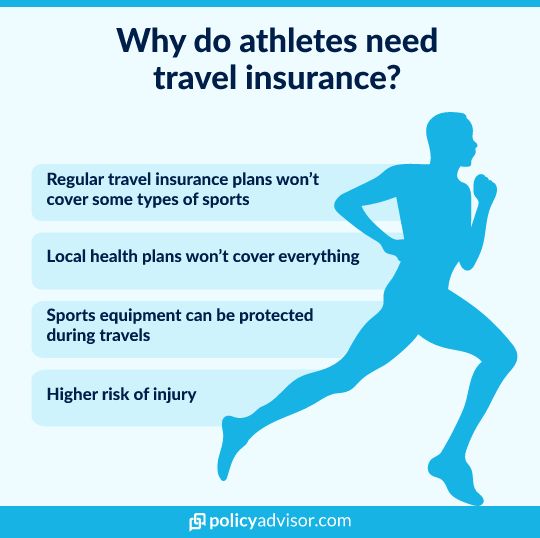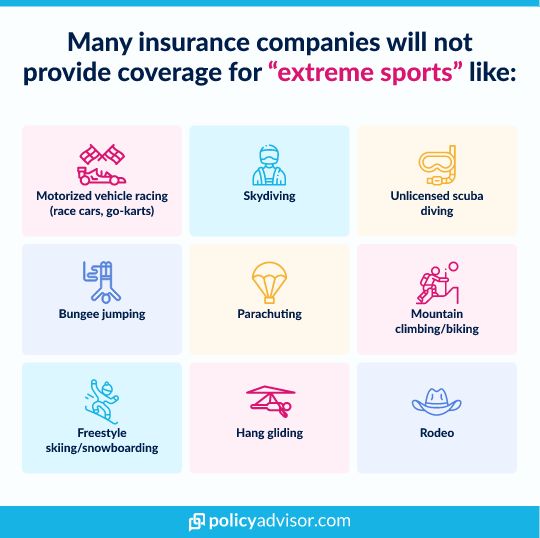The athlete’s guide to travel insurance in Canada
Many insurance companies offer specialized travel insurance for athletes visiting Canada, or Canadian athletes travelling from one province to another. Because of their occupation, athletes often have greater insurance needs and should ensure they are covered in case of injury when travelling to compete.
- Does Canada’s healthcare program cover visitors?
- What is athlete travel insurance?
- Does travel insurance cover international athletes travelling to Canada for sporting activities?
- Does a Canadian athlete travelling to another province for a sporting competition need insurance?
- Does travel insurance cover extreme sports?
- Does athlete travel insurance cover athletes participating in a non-sanctioned sporting event?
Buying travel insurance is always a good idea if you are visiting another country. But does it provide sufficient coverage for athletes travelling for sporting events? The answer varies depending on the type of sporting event and whether the event is sanctioned.
In this article, we look at common exclusions in traditional travel insurance — like extreme sports — and why athlete travel insurance could be a better option.
Does Canada’s healthcare program cover visitors?
If you are travelling to Canada from abroad, the country’s healthcare program will not provide you with coverage. Each province has its own healthcare system that offers many free services to Canadian citizens and permanent residents. If you are a traveller in Canada, you will be treated and receive care in a medical emergency, but the costs of this care will not be paid by the healthcare system.
For this reason, it is a good idea to protect yourself with travel health insurance. Travel insurance will cover the costs associated with emergency medical care, including prescription medication, hospitalization, and emergency transportation (like land or air ambulance services).
What is visitors insurance?
Visitors insurance refers to several different kinds of coverage you can purchase for a trip to Canada. These can include travel insurance that covers trip-related delays, emergency medical coverage, super visa insurance, and other types of comprehensive coverage.
Learn more about visitors to Canada insurance.
Some of the most common types of visitors insurance include:
- Travel insurance for trip-related incidents
Insurance that covers things like flight delays, trip interruption, trip cancellation, hotel stays, lost baggage, etc.
- Travel medical insurance
Insurance that covers the medical costs incurred from any medical emergencies you experience during your trip, including hospital stays, ER visits, cost of prescription drugs, medical transportation, medical evacuations, and similar unexpected medical bills.
- Super visa insurance
This insurance is very similar to travel medical insurance but is tailored to fit the parameters of Canada’s super visa program. The super visa allows parents or grandparents of Canadian residents to visit for up to five years, with the option to apply for a two-year extension (as of July 4, 2022). Learn more about super visa insurance and super visa insurance payments.
What is athlete travel insurance?
Athlete travel insurance policies are similar to traditional travel policies, only they can be broader in scope, providing coverage for specific sporting activities. This type of insurance takes into account the health and safety risks of certain sports and may consequently have higher premiums. Athlete travel insurance can also provide coverage for sporting competitions as well as coverage for lost or stolen luggage and trip cancellation.
For this type of plan, it is vital you disclose all the activities you plan to participate in. If you sustain an injury playing a sport not covered under your travel plan, medical payments will have to be made out of pocket.
Where can you get travel insurance in Canada?
You have several different options for purchasing travel insurance:
- Travel agent
The travel agent through which you booked your trip may have access to travel insurance plans. But most travel agents deal with a single provider, so they don’t typically offer the most choice of plans. - Employee or group insurance provider
Your group benefits provider may offer the ability to purchase additional travel insurance through your group plan. Again, one downside to this approach is you are unable to compare the prices and plans of different carriers. - Credit card coverage
If you booked your trip on your credit card, you may also be entitled to some insurance coverage. Check the details of the policy before your trip so that you know of any limitations to your coverage. You typically cannot buy supplementary travel insurance through this plan, as it is an added benefit of your credit card agreement. Learn more about credit card travel insurance and its limited coverage. - Insurance broker
An insurance broker (like PolicyAdvisor) can present you with several different choices of policies, providers, and premiums so that you can choose the coverage that would best suit your trip and budget. They can also offer insight into the claims process and guide you to which company would work best for the type of vacation or travel away from Canada you plan on making.
Does travel insurance cover international athletes travelling to Canada for sporting activities?
For some athletes, a traditional travel policy may be enough to cover their needs while in Canada for a sporting activity. For instance, if you decide to participate in a running event while on holiday in Canada or play basketball for leisure, a standard insurance plan should cover the costs of any medical care if you are injured.
But other sports — including extreme sports and contact sports — may not be covered by a conventional travel insurance plan. This is because they come with a higher risk of accident or injury.
Additionally, traditional travel insurance rarely covers athletes travelling to Canada for a paid sporting competition. In other words, if there are monetary prizes to be won in your sporting activity, traditional travel insurance will rarely cover the risk. A professional athlete who is paid for their sport may also have to deal with certain policy exclusions.
In these cases, you will require specialized coverage designed for athletes, which includes broader coverage and often higher premiums.
Does a Canadian athlete travelling to another province for a sporting competition need insurance?
Canadian athletes travelling within Canada for a sporting competition do not necessarily require travel medical insurance. Under the Canada Health Act, all Canadian citizens can receive medical services across the country if they are considered necessary.
That being said, provincial health plans (like OHIP in Ontario) do have limits, and not all costs will necessarily be reimbursed. For example, provincial healthcare may not fully pay for ambulance services or transportation, medical devices, prescription drugs, emergency dental care, or a medical evacuation flight if needed.
It can therefore be helpful to buy additional travel insurance when travelling within Canada. This insurance can cover emergency medical bills not covered by a government health insurance plan, as well as provide protection should something happen to your baggage or sporting equipment or if your trip is cancelled.
However, as with all insurance policies, it is critical to read the fine print as some insurance companies will have exclusions based on sporting competitions. In some instances, insurance companies will actually refuse to pay out claims for injuries that result from training for or participating in professional sporting activities.
If ever in doubt, speak with your insurance provider or one of our expert advisors for help with making sure you have the right coverage for your specific needs.
Does travel insurance cover extreme sports?
Travel insurance plans have different coverage criteria when it comes to athletic activities and especially extreme sports. Coverage comes down to a few factors: the insurance provider, where you are playing the sport, whether specialized equipment is needed, and what the sport is.
Some insurance companies do offer optional coverage for extreme sports to an extent and at an additional cost. Exactly how much more extreme or “adventure” sports coverage will cost you depends on the sport and whether your insurance is for a single trip or multi-trip, annual plan, among other factors.
What’s considered “extreme sports”?
There are different categories of sports that may not be included in traditional travel coverage, most often extreme sports and contact sports.
Broadly speaking, many insurance providers will not provide coverage for “extreme sports” that have a higher risk of accident or injury. These include:
- Skydiving
- Bungee jumping
- Parachuting
- Mountain climbing
- Mountain biking
- Hang gliding
- Freestyle skiing or snowboarding
- Motorized vehicle racing
Many underwater activities, like scuba diving, are also considered extreme. In this case, however, most travel insurance providers will include certain limitations and specific eligibility criteria rather than outright exclusions. For example, if you have obtained official certification for amateur scuba diving, you may be eligible for traditional travel insurance coverage. But watersports experts DiveIn highly recommend divers consider purchasing specialized diving insurance on top of standard travel insurance.
Contact sports may also be excluded from basic travel insurance and require additional coverage. As the name suggests, contact sports are those that authorize and require direct physical contact with people, such as:
- Football
- Hockey
- Rugby
- Lacrosse
- Boxing
What sports are covered under standard travel medical insurance?
Many sports are automatically covered by standard travel medical insurance. These sports are deemed low or moderate risk and do not require specialized coverage (unless practiced professionally or for pay). Covered sporting activities include:
- Cross-country skiing
- Cycling
- Downhill skiing or snowboarding on authorized trails
- Golf
- Non-contact team sports (i.e. basketball, baseball, soccer)
- Non-motorized boating (i.e. canoeing, kayaking, sailing)
- Skating
- Swimming
What sports aren’t covered at all?
Across the board, insurance companies will not provide any coverage for sports that require either a motorized vehicle, such as motorbike, race car, or go-kart, or equipment for flying, such as parachutes or hang gliders. Other high-risk activities like mountaineering are generally excluded from coverage too. In almost all policies — including those with specialized athlete coverage — rodeo sports and activities are excluded.
Unlicensed underwater activities, such as scuba diving, are often excluded. In other words, you need to complete certified scuba training to qualify for coverage. And most standard travel plans will exclude any paid professional sporting activities or contests with monetary prizes.
If you are planning sporting activities on a holiday or expect to participate in professional athletics, it is important to check with your insurance provider about coverage specifics.
Does athlete travel insurance cover athletes participating in a non-sanctioned sporting event?
In Canada, many athlete travel insurance policies will only provide coverage for sanctioned sporting events. Sanctioned sporting events are organized by an authorized group and have been formally approved by regulatory bodies. It is therefore important to check the policy’s fine print if you plan to participate in a non-sanctioned sporting event.
In some cases, sanctioned sporting events and authorized sporting associations will themselves provide insurance coverage to athletes if they are injured during an event. For example, professional athletes can often receive insurance coverage through their sanctioned professional associations.
While most travellers can benefit from some form of travel insurance, those who require extra coverage — like athletes or snowbirds — should pay particular care to make sure they have enough coverage for their needs.
If you need to make sure your plan covers you, or just need guidance on what’s available for your needs and within your budget, chat with one of our advisors. We can help to point you in the right direction.
- Athlete travel insurance provides health insurance coverage for athletes travelling to/within Canada to participate in sports
- Provincial/territorial health plans have limited coverage and do not cover visitors to Canada, so athletes can benefit from travel medical insurance
- Some sports are considered extreme and coverage will cost more, while some sports and non-sanctioned events may not be covered at all


 1-888-601-9980
1-888-601-9980


